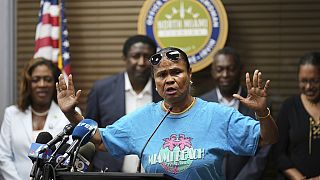Africa
African heads of state gather Sunday at the headquarters of the African Union for a summit meeting due to focus on how the body can play a more prominent role in resolving conflicts proliferating across the continent.
The two-day summit has taken as its theme “Silencing the Guns”, yet AU officials are well aware of their failure to achieve the goal adopted in 2013 of ending “all wars in Africa by 2020”.
In remarks to African foreign ministers ahead of the summit, AU Commission Chairman Moussa Faki Mahamat painted a bleak picture of the continent’s security situation, citing extremist threats stretching from the Sahel to Somalia.
The “missed deadline” to silence the guns, he said, “reveals the complexity of the security situation in Africa.”
The focus on conflicts this year marks a departure from multiple years of summits dedicated to reforming the AU — including its funding structure — and the implementation of a continent-wide free trade area.
There are multiple hot spots to choose from.
Though some progress has been made recently in Central African Republic and Sudan, long-running conflicts in places like Libya and South Sudan have been joined by new crises from Cameroon to Mozambique.
South African President Cyril Ramaphosa, who will take over from Egyptian President Abdel Fattah al-Sisi as AU chair, appears attuned to these challenges.
In a speech to South Africa-based diplomats in late January, he warned that conflict “continues to hamper” development.
The AU “must be more proactive” in responding to conflicts instead of leaving the job to outside powers, Naledi Pandor, South Africa’s international relations minister, told AFP.
“The fact that anyone can step in means a gap has been allowed by us, and so I think we have to act faster, be more responsive when matters are affecting our continent,” she said.
For his part, Faki encouraged a focus on “root causes” of conflicts and urged African leaders to pursue “innovative solutions that put the military solution into perspective by combining it with measures from other areas, notably development.”











Go to video
Paraguayan town celebrates vibrant Kamba Ra'anga festival with masks, fire and tradition
01:47
Chinese city of Xuchang is world's biggest producer of wigs
01:15
U.S. considers adding more African countries to travel ban
01:00
Renewed calls to end plastic pollution on World Environment Day
00:52
Bill Gates says most of his $200 billion fortune will go to Africa over next 20 years
Go to video
Africa’s First Multilingual Small Language Model Gets Even Smaller - Thanks to Top African Innovator